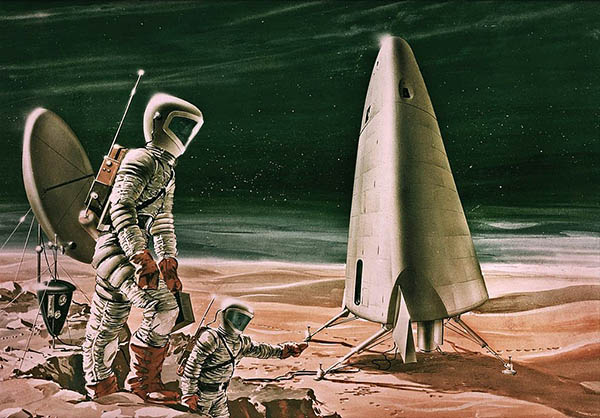There’s nothing quite as satisfying for the modern as an historical prediction about the future, or about a large transformational project, that has—inevitably—failed. Whether as specific as predictions of particular technologies (where’s my flying car?), or as general as claims that market solutions will erase social inequalities (capitalism will eventually end poverty!), critical scholars have demonstrated that faith in a progressive future is fundamentally a political and ideological project of the modern era. But this satisfaction with modernity’s failures alerts us to the fact that we never-moderns still have faith in one kind of prediction, which is precisely the prediction of inevitability of failure of such transformational projects and their promised positive futures. Indeed, one could say that what we call the end of the modern or of history was inducted in this affective mode: an ironic stance toward now-faded modernist futures, their hubris and hopefulness simultaneously exposed as illusions of a progressive but failed modernity.

Image: Artist’s conception of the Mars Excursion Module (MEM) proposed in a NASA Study in 1964. Source: Wired (via Wikimedia), public domain.
This is nowhere more apparent than in critical approaches to the human conquest of space beyond Earth. The recent negative publicity about Mars One is a case in point. Announced in 2012, Mars One’s founder, Bas Lansdorp, proposed sending privately-funded, one-way human missions to the Red Planet with volunteer crews, enabling the establishment of a Mars colony by 2029. Lansdorp has argued that such a remarkable goal could be achieved using existing technologies and could be funded by media rights to what, he argued, would be the solar system’s most-watched reality television program. Mars One and its volunteer crew selection process garnered enormous interest in the press, on television, and online, but its previous media-darling status is now on rocky ground due to the revelations of a mission finalist. As such, it now appears as yet another fantasy of universalizing capitalist relations, dashed on the shores of technological impossibility and capital’s internal contradictions, leaving capitalism (and the human species) to face its consequences firmly on Earth and begin its atonement at the dawn of the Anthropocene, that is, the current, human-impacted geological epoch of Earth.

Image: Terraforming Mars, by D Mitriy, some rights reserved (source: Wikimedia Commons).
In my six-year ethnographic project, currently in its final stages, on outer space settlement advocates and their visions of the future, study participants have also been privately predicting Mars One’s failure for years, though for different reasons than those of media and scholarly observers. Despite Mars One’s claims, the engineers, rocket scientists, and entrepreneurs who have been involved in the space settlement movement for decades saw the practical holes in this future plot line all too quickly.
But the synchrony between these analyses of Mars One’s failure is not my point; rather, it is the differences between their opening premises and the consequences of those differences. What intrigues me is how the cracks in Mars One’s plans reveal differences in how to span the gap between past, present, and future for which, as Hannah Arendt notes, we are poorly prepared. Since her 1963 essay, The Conquest of Space and the Stature of Man, outer space has been, for scholars on the left, the site both of an ultimate dehumanization and of fantastical modern, technologized statecraft, distracting us from our imminent collision course with auto-extinction. Mars One stands as the latest example of such fantasy. For outer space settlement advocates, the multiple possible locations for humans and their ecologies in space—including on Mars—are the very promise of human futurity. Mars One, for them, is just poorly planned and resourced.
The challenge I face in my current research and writing is how not to write off the futurity of my informants’ visions with a check issued by the urgency of the contemporary, for despite the long list of gaps in Mars One’s plans, there is a huge amount of labor and capital involved in better-planned visions for space settlement—so large that it would be dangerous to write off its effects, whatever they may be, as mere fantasy. Without discarding the important insights of Arendt and her intellectual descendants, my work is to take seriously both the engineering and scientific labor of my informants and the visions of the future that drive them. What is profoundly anthropological about their work is the requirement to take space not as an empty signifier guaranteeing the modern, capitalism, or the future, but as the location of real places (as Lisa Messeri has shown), as multiple kinds of nature to which humans may adapt themselves through technological interventions. That is, they take the difference of space not necessarily as a contrast to Earth or as a site of escape from Earth, but as multiple places that are also different from each other and that thus that require different kinds of thinking about what a future world might be. That attention to “world” and future must incorporate everything from gravity, air, light, and food to labor, race, gender, and exchange, to haircuts, proprioception, sunlight, and privacy.
My query is this: What difference (to world, to future, to imagination, to science) is introduced by outer space that makes our critical tools inadequate for thinking about difference, relations, and humans beyond Earth? And might this difference, then, introduce a possibility for thinking futurity not simply in terms of modernity’s failed progress but along lines of multiple ways of becoming? That is the question with which I am grappling as I begin to write my book based on this research. Stay tuned!
David Valentine is Associate Professor of Anthropology at the University of Minnesota. His first book, Imagining Transgender: An Ethnography of a Category (Duke University Press 2007), examines the politics of the emergence of “transgender” as a category of identity, analysis, and political action. His current research is a longitudinal study of imaginings and narratives of the future among commercial outer space entrepreneurs, funded by the National Science Foundation (BCS-1127070).

1 Comment
don’t see any evidence (in research, scifi, etc) that our attempts to grasp outer space have lead to any particular challenges to our critical tools (about difference) or anything else. Why would such endeavors be of a different kind to our more local/earthly ones?